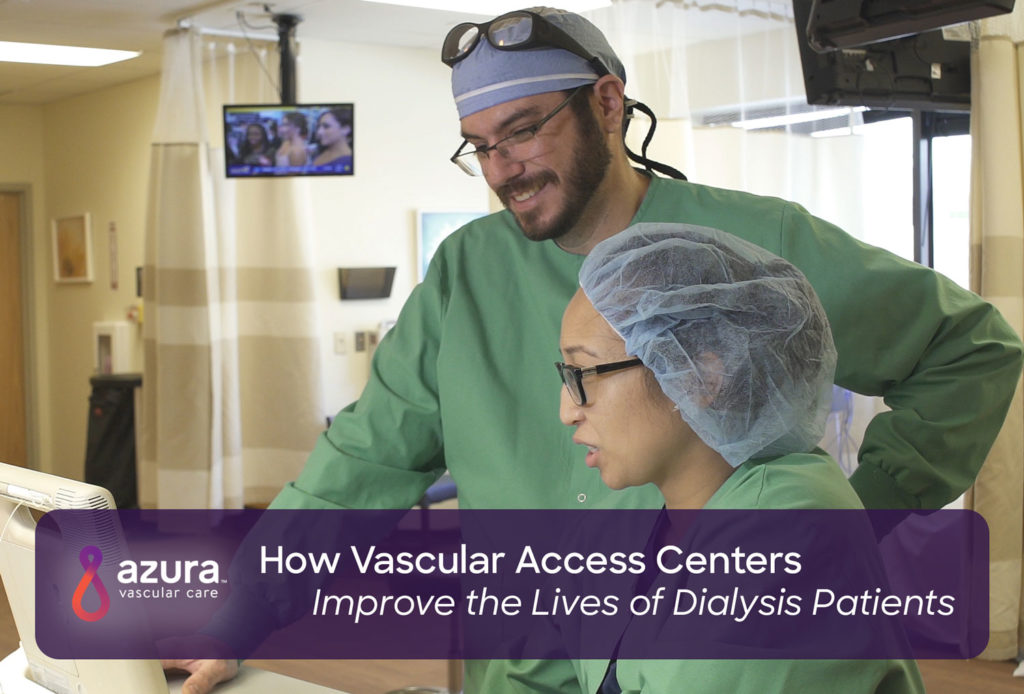
Complications with a dialysis access can result in significant issues for dialysis patients, including infection and missing scheduled treatments. It’s important to contact your care team right away if you are experiencing any issues with your dialysis access. If your access is not working properly, your doctor may refer you to a specialist at an outpatient vascular access center for dialysis access care and management. Access intervention, including angioplasty, stenting, thrombectomy and thrombolysis, may be performed by a vascular specialist to improve or restore access flow and avoid missed dialysis treatments.
If you are wondering, what is a vascular access center, and, can it improve your dialysis experience, read on to learn more!
What Is a Vascular Access Center?
A vascular access center is an outpatient medical facility that provides treatment to dialysis patients for access care and management. If complications arise with a dialysis patient’s access, the vascular specialist and clinical team will work to resolve the problem as soon as possible. This allows patients to get back on track with their dialysis treatment without lengthy delays or the need for hospitalization.
Vascular access centers also offer minimally invasive treatment options to patients with vascular conditions such as peripheral artery disease, varicose veins, uterine fibroids and more. Patients can receive same day treatment with a quicker recovery and avoid missed dialysis treatments and the complications of a hospital admission.
Benefits of a Vascular Access Center
Improved Outcomes for Dialysis Patients
 Receiving care at a vascular access center is associated with improved outcomes for dialysis patients. Studies have shown that dialysis patients who use vascular access centers are less likely to be hospitalized with access-related complications. (i) These complications can delay scheduled dialysis treatments and can sometimes be life-threatening.
Receiving care at a vascular access center is associated with improved outcomes for dialysis patients. Studies have shown that dialysis patients who use vascular access centers are less likely to be hospitalized with access-related complications. (i) These complications can delay scheduled dialysis treatments and can sometimes be life-threatening.
The staff at vascular access centers are highly trained and can offer expedient service, focused attention and dedication while delivering optimal outcomes.
Minimally Invasive Outpatient Procedures
Vascular access centers specialize in minimally invasive outpatient procedures. Outpatient procedures are a safe and effective option for many patients with dialysis access issues. In some cases, outpatient procedures may be preferable to inpatient or hospital-based procedures.
Most procedures offered at a vascular access center are minimally invasive. These cutting-edge treatments usually require only small incisions. Tiny incisions help reduce the risk of scarring and infection. (ii) That’s important since dialysis patients are at an increased risk of developing infections. (iii)
Minimally invasive outpatient procedures also offer a shorter recovery time. Open surgeries might require a hospital stay and lengthy recovery period, as well as a higher risk of post-surgical complications (iv), but minimally invasive outpatient procedures get you home the same day, with no overnight hospital stay, letting you return to your normal activities much sooner. (ii)
Consistent Care Team
 When you receive care at a hospital or other large medical facility, you may have to see different medical providers. The rotating staff of doctors, nurses, and radiologists can make it difficult to receive care from the same clinicians, and you may not have the chance to build a relationship with one medical provider.
When you receive care at a hospital or other large medical facility, you may have to see different medical providers. The rotating staff of doctors, nurses, and radiologists can make it difficult to receive care from the same clinicians, and you may not have the chance to build a relationship with one medical provider.
At vascular access centers, you’ll work with a much smaller circle of medical professionals who will get to know you. The staff treats only vascular health concerns, so they can offer valuable expertise and personalized care. (v)
Comfortable and Friendly Environment
Vascular access centers are designed to be comfortable and patient-friendly. They offer a supportive setting to help keep patients at ease during their treatment.
The medical providers at a vascular access center take the time to listen to your concerns. If you have questions about your vascular health condition, you’ll have the chance to discuss your treatment options with a knowledgeable professional.
Same Day, Next Day Care
A clotted access can disrupt dialysis treatment. Over time, this can trigger dangerous complications (i), and at a hospital, even patients with serious health concerns often have to wait for long periods of time receive treatment. (vi)
At a vascular access center, the care of dialysis patients takes high priority. Dialysis patients usually receive same-day or next-day appointments with a qualified medical professional who specializes in dialysis access care. The staff at a vascular access center works hard to resolve any dialysis access complications right away, so you don’t have to spend hours in a hospital waiting room.
Vascular Access Centers Put Your Needs First
 At a vascular access center, patients come first. You’ll work with specialists—interventional radiologists, interventional nephrologists and vascular surgeons—who understand the health challenges that a dialysis patient or a patient with a vascular condition might face. Adhering to the same rigorous standards and regulations as a hospital setting, vascular access centers provide consistent, high-quality care in a comfortable environment.
At a vascular access center, patients come first. You’ll work with specialists—interventional radiologists, interventional nephrologists and vascular surgeons—who understand the health challenges that a dialysis patient or a patient with a vascular condition might face. Adhering to the same rigorous standards and regulations as a hospital setting, vascular access centers provide consistent, high-quality care in a comfortable environment.
Do you have questions about your dialysis access? Download our free guide to understanding your dialysis access.
Sources:
(i) Mishler, R., Sands, J., Ofsthun, N., Teng, M., Schon, D., & Lazarus, J. (2006). Dedicated outpatient vascular access center decreases hospitalization and missed outpatient dialysis treatments. Kidney International, 69(2), 393-398. doi:10.1038/sj.ki.5000066.
(ii) Mayo Clinic. (2015, September 29). Multiple benefits to minimally invasive surgery. Retrieved September 25, 2018, fromhttps://mayoclinichealthsystem.org/hometown-health/speaking-of-health/multiple-benefits-to-minimally-invasive-surgery.
(iii) Centers for Disease Control and Prevention. (2018, February 14). Dialysis safety. Retrieved September 25, 2018, from https://www.cdc.gov/dialysis/index.html.
(iv) Becker’s Hospital Review. (2017, December 20). Advantages of ASC vs hospital-based procedures. Retrieved September 25, 2018, from https://www.beckershospitalreview.com/facilities-management/advantages-of-asc-vs-hospital-based-procedures.html.
(v) Dialysis Vascular Access Coalition. (n.d.). Vascular access centers. Retrieved September 25, 2018, from http://dialysisvascularaccess.org/vascular-access-centers/.
(vi) Centers for Disease Control and Prevention. (2014, May 16). Median emergency department (ED) wait and treatment times by triage level. Retrieved September 25, 2018, from https://www.cdc.gov/mmwr/preview/mmwrhtml/mm6319a8.htm.